- Home
- Frank Herbert
Four Unpublished Novels
Four Unpublished Novels Read online
Book Description
Frank Herbert will forever be known as the “author of Dune,” the science fiction masterpiece that made his career and made his name. But he was an exceptionally diverse author who wrote in numerous genres. Even at the beginning of his writing career, Frank Herbert wrote whatever inspired him, irrespective of genre, market, or audience tastes.
After the success of his first novel The Dragon in the Sea (1955), Herbert wrote numerous novels and short stories that failed to find a market. He persevered until finally, seven years later, he wrote the most unpublishable novel of all, Dune—which, once it finally found a home with an obscure publisher, finally made Frank Herbert a household name synonymous with science fiction.
This volume collects four of those complete, never-before-published novels written before Dune: High-Opp, a dystopian science fiction novel; Angels’ Fall, a jungle survival adventure; A Game of Authors, a Cold War thriller; and A Thorn in the Bush, a mainstream novel based on some of Herbert’s experiences in Mexico.
Smashwords Edition – 2016
WordFire Press
wordfirepress.com
ISBN: 978-1-61475-340-7
Four Unpublished Novels
Omnibus edition copyright © 2015 Herbert Properties, LLC
High-Opp copyright © 2012 Herbert Properties, LLC; originally published April 2012 by WordFire Press
Angels’ Fall copyright © 2013 Herbert Properties, LLC; originally published April 2013 by WordFire Press
A Game of Authors copyright © 2013 Herbert Properties, LLC; originally published November 2013 by WordFire Press
A Thorn in the Bush copyright © 2014 Herbert Properties, LLC; originally published November 2014 by WordFire Press
All rights reserved. No part of this book may be reproduced or transmitted in any form or by any electronic or mechanical means, including photocopying, recording or by any information storage and retrieval system, without the express written permission of the copyright holder, except where permitted by law. This novel is a work of fiction. Names, characters, places and incidents are either the product of the author’s imagination, or, if real, used fictitiously.
This book is licensed for your personal enjoyment only. This ebook may not be re-sold or given away to other people. If you would like to share this book with another person, please purchase an additional copy for each recipient. Thank you for respecting the hard work of this author.
Cover design by Janet McDonald & Kevin J Anderson
Art Director Kevin J. Anderson
Cover artwork images by Shutterstock & Dollar Image Club
Book Design by RuneWright, LLC
www.RuneWright.com
Kevin J. Anderson & Rebecca Moesta, Publishers
Published by
WordFire Press, an imprint of
WordFire, Inc.
PO Box 1840
Monument, CO 80132
Contents
Book Description
Title Page
Introduction
High-Opp
Chapter One
Chapter Two
Chapter Three
Chapter Four
Chapter Five
Chapter Six
Chapter Seven
Chapter Eight
Chapter Nine
Chapter Ten
Chapter Eleven
Chapter Twelve
Chapter Thirteen
Chapter Fourteen
Chapter Fifteen
Chapter Sixteen
Chapter Seventeen
Chapter Eighteen
Chapter Nineteen
Chapter Twenty
Chapter Twenty-one
Chapter Twenty-two
Chapter Twenty-three
Chapter Twenty-four
Chapter Twenty-five
Chapter Twenty-six
Chapter Twenty-seven
Chapter Twenty-eight
Angels’ Fall
Game of Authors
Chapter One
Chapter Two
Chapter Three
Chapter Four
Chapter Five
Chapter Six
Chapter Seven
A Thorn in the Bush
Chapter One
Chapter Two
Chapter Three
Chapter Four
Chapter Five
Chapter Six
Chapter Seven
Chapter Eight
Chapter Nine
Chapter Ten
About the Author
Other WordFire Press Titles by Frank Herbert
Introduction
Frank Herbert will forever be known as the “author of Dune,” the science fiction masterpiece that made his career and made his name. But he was an exceptionally diverse author who wrote in numerous genres. Even at the beginning of his writing career, Frank Herbert wrote whatever inspired him, irrespective of genre, market, or audience tastes.
His first novel, The Dragon in the Sea, was published by Doubleday in 1955 and bought outright by Universal Studios for film (the movie was never made). A tense science fiction war drama set aboard a futuristic submarine hauling fuel through enemy lines—the story focused on the pressures encountered by the crew when faced with insurmountable dangers, a science fiction spin on Das Boot.
The Dragon in the Sea proved to be a success, even resulting in film interest, and Frank Herbert wrote another novel, and another, and another—thrillers, mysteries, science fiction, mainstream (including the SF dystopia High-Opp, released by WordFire Press in 2012). His agent, Lurton Blassingame, couldn’t sell any of them.
With his family on the road in Mexico, Frank Herbert tried to eke out a living as a writer (as described in detail in Brian Herbert’s Hugo-Award-nominated biography Dreamer of Dune). He followed up Dragon with a succession of manuscripts, novels, and stories of all types: thrillers mysteries, science fiction, mainstream.
None of them could find a market.
But he was determined and followed his creative vision with tale after tale, all of which remained unpublished. Among them were A Game of Authors, Angels’ Fall, “Paul’s Friend,” “Wilfred,” “The Waters of Kan-E,” “The Yellow Coat,” “Public Hearing,” High-Opp, and many others.
Undaunted, Frank Herbert penned books and stories … until he wrote the most unpublishable novel of all, a massive SF epic called Dune, which was rejected more than twenty times before being released by an obscure publisher of auto-repair manuals. Dune went on become one of the best-selling SF novels of all time.
In this volume are collected four complete novels written during Frank Herbert’s years of struggle. These manuscripts were complete and edited to Herbert’s satisfaction, which his agent then submitted to numerous publishers. Other than the correction of the occasional typo, WordFire Press has reproduced these novels as Herbert wrote them.
High-Opp is a dystopian novel about high society and low society, a story that would prove oddly prescient about today’s class-warfare debates. Daniel Movius, a successful bureaucrat who scores high in the public opinion polls that drive society, is betrayed and finds himself stripped of everything, cast down to the dregs of society—which he discovers are ripe for revolution.
Angels’ Fall (originally titled We Are the Hounds) is a jungle survival adventure that features Frank Herbert’s characteristic microcosm of people under intense stress. The following is how he described the book to his agent when he’d completed it:
December 18, 1957
Dear Lurton:
Here’s the new novel. (Bev says it takes two people to write a novel: one to write it, and one to hit the writer over the head when it’s finished. She borrowed my shillelagh for the occasion.)
/> From this distance (which somewhat garbles information) I get the impression of Doubleday that they’re kind of the Ford Motor Co. in book publishing. You can’t tell one novel from another without the license plates. Admittedly, this is over-simplification. But I’d hate to have this piece get lost on somebody’s assembly line, and painted blue instead of red.
That’s why I’m suggesting (a suggestion you may take only if you agree) that we try Hounds on a smaller publishing house, or one with a reputation for putting a heavy concentration of effort on a book they think will go (Scribners?). I can’t be certain from here. But I do believe that this novel will run away if it’s given any kind of push at the beginning.
(This is not to say that Doubleday didn’t get all the mileage there was out of Dragon.)
The book selling business is booming out here. A friend’s store is some 60% ahead of last year. (We helped him somewhat with his motivational research methods applied to his promotion.)
Season’s greetings and all that.
Best regards,
Frank
Five years later, with many rejections and no further novels published, Frank Herbert had parted ways with Lurton Blassingame, revised the manuscript substantially, and changed the title from We Are the Hounds to Angels’ Fall. Then he went in search of another agent.
April 30, 1962
Dear Mr. Halsey:
Here is the opus we discussed over the telephone.
An earlier version of this went to my previous agent, Lurton Blassingame, in New York almost three years ago. [Note: it was actually five years.—ed] I asked for his comments and suggestions. Instead, he showed it to several readers, and returned it. Blassingame and I are no longer associated. The attached is a very different story from what he saw.
This one is written with a low-budget movie version in mind—minimal number of sets, four sustaining characters … and you’ll see what I mean.
Best regards,
Frank Herbert
Unfortunately, Angels’ Fall found neither a film studio nor a publisher.
A Game of Authors is a suspenseful Cold War thriller. In pursuit of a scoop, American journalist Hal Garson follows up on a mysterious, desperate letter that points to the whereabouts of legendary author Antone Luac, who vanished without a trace in Mexico years ago. The celebrated writer's disappearance is an enduring mystery, and Garson senses this story will make his career.
Despite warnings, he travels to isolated Ciudad Brockman and begins asking questions … too many questions, which places him in the crossfire of a local crime lord, a Communist insurgent group, and finally to the imprisoned writer—and his beautiful daughter—who may not want to be found.
Finally, A Thorn in the Bush, a short mainstream slice-of-life novel inspired by Herbert’s travels in Mexico (as was A Game of Authors) deals with an American woman hiding from her past in an isolated Mexican town of San Juan, a place where she can be content, a place where no one knows about her shadowy past life. Until an ambitious American painter takes up residence in San Juan, attempting to depict—and expose—everything about the sleepy Mexican town. But he may have underestimated the lengths a seemingly harmless old woman will go to protect her secrets.
WordFire Press initially published these lost works in invidual volumes and now they are collected here for the first time. A volume collecting Frank Herbert’s unpublished short stories is also available from WordFire Press (Fall, 2015).
—Kevin J. Anderson
High-Opp
Chapter One
People averting their faces as they walked past the office door finally wore through his numbness. Daniel Movius began to clench and unclench his fists. He jerked out of his chair, strode to the window, stared at the morning light on the river.
Far out across the river, in silver layers up the Council Hills, he could see the fluting, inverted stalagmites of the High-Opp apartments. And down below them, the drabness, the smoke, the dismal carpet of factories and Warrens.
Back into that? Damn them!
Footsteps. Movius whirled.
A man walked past the door, examined the blank opposite wall of the corridor. Movius raged inwardly. Sephus! You son of a Sep! A woman followed. Bista! I’d as soon make love to a skunk!
Yet only yesterday she had made courting gestures, bending toward him over her desk to show the curves under the light green coveralls.
He hurled himself into his chair, sent the angry thoughts after them, the words he dared not use. “Avert your faces, you clogs! Don’t look at me!”
Another thought intruded. In Roper’s name, where was Cecelia? Was she another averted face?
Two men appeared in the doorway pushing a handcart loaded with boxes. Movius did not recognize them, but the LP above their lapel numbers told him. Workers. Labor Pool rabbits. But now he was one of the rabbits. Back into the LP. No more special foods at the restricted restaurants, no more extra credit allowance, no Upper Rank apartment, no car, no driver, no more courting gestures from such as Bista. Today, he was Daniel Movius, EX-Senior Liaitor.
One of the workmen at the door coughed, looked at the desk plaque which Movius had not yet removed. “Excuse me, sir.”
“Yes?” His voice still held its tone of command.
The workman swallowed. “We were told to move the Liaitor files to storage. Is this.…”
He could see the workmen’s manner change. “Well, if you’ll excuse us, we have work to do.” The men came in with an overplayed clatter of officiousness, banging the handcart against the desk. They turned their backs on him, began emptying files into boxes.
Stupid low-opp rabbits!
Movius finished dumping the contents of his desk drawers into the wastebasket, topped the pile with his name plaque. He saved only a sheet of pale red paper. The message chute had disgorged the paper onto his desk less than an hour ago, as he’d been sorting the morning mail.
Opinion SD22240368523ZX:
On this date, the Stackman Absolute Sample having been consulted, the governmental function of Liaitor is declared abolished.
The Question:
For tax economy reasons, would you favor elimination of the supernumerary department of Liaitor?
Yes: 79.238 percentum.
No: .647 percentum.
Undecided: 20.115 percentum.
May the Majority rule.
With motions of thinly suppressed violence, Movius folded the paper, thrust it into a pocket. “For tax economy reasons!” They could get a yes-opp matricide for tax economy reasons!
One last look around the office. It was a big place, scaled for a large man, an orderliness to it under the apparently random placement of desk, filing cabinets, piled baskets of papers. There was a smell about the room of oily furniture polish and that kind of bitter chemical odor found in the presence of much paper. It was a room with an air of dedication and no doubt about it. Dedication to quadruplicate copies and the-right-way-of-doing-the-job.
Movius noted that his phone had been dislodged from its cradle beside the desk. He replaced it, ran a hand through his stubble of close-cropped sandy hair, unwilling now that the moment had come, to say goodbye to this space in which he had worked four years. The room fitted him like an old saddle or like the body marks in a long-used bed. He had worn his grooves into the place.
Low-opped! And with so much unfinished work. Bu-Opp and Bu-Q were going to be at each others throats before the month was out. The government was damned soon going to find out it had need for Liaison. The bureaus were too jealous of their domains.
Damn them!
He stared at the workmen. They had cleared two files, were emptying a third. Movius was ignored; another discard to be stored away and forgotten. He wanted to fling himself on the men, knock them into a corner, scatter the papers, wreck things, tear things, destroy. He turned and walked quietly out of the office, out of the building.
On the front steps he paused, his eyes seeking out his parking slot in the third row. There w
as Navvy London, the driver, leaning against the familiar black scarab shape of the car. THE CAR—a primary token of authority. Sunlight shimmered on the flat antenna, which spanned the curving roof. Movius looked up to the left where the scintillant red relay ship hovered above the spire of the prime generator, sending out its invisible flagellae of communication and energy beams from which the city sucked its power.
He wished for the strength to hurl all of his pent-up curses at this symbol of authority. Instead, he lowered his eyes, again sought out the car, that tiny extension of the relay ship. Navvy leaned against the grill in his characteristic slouch, reading a book—one of those inevitably deep things he always carried. The driver pulled at his lower lip with thumb and forefinger, turned a page. Movius suspected that some of Navvy’s books were on the contraband lists, but the man was the kind to carry it off. A look of youthful innocence in his brown eyes, a wisp of black hair down across his forehead to heighten the effect. “A contraband book, sir? Great Gallup! I didn’t think there were any more of those things drifting about. Thought the government had burned them all. Fellow handed it to me on the street the other day when I asked what he was reading.”
Seeing Navvy brought back a disquieting thought: How had Navvy known about the low-opp? How did a Labor Pool driver get official information before it became official?
Movius slipped between the First Rank cars, the Second Rank cars, slowed his pace as he approached the relaxed figure of the driver.
Navvy sensed Movius’ presence, looked up, pushed himself away from the car. His young-old face became contemplative. “Now do you believe me, sir?”
Movius drew a deep breath. “How did you know?”
The contemplative look was replaced by casualness. “It came over the LP grapevine.”
“That’s what you said before. I want to know how.”
“Maybe you’ll find out now that you’re an LP,” said Navvy. He turned toward the car. “Anyplace I can take you? They haven’t assigned me yet. They’re still upstairs wrangling over who’ll get my carcass.”
“I’m no longer privileged, Navvy. It’s forbidden.”
“So it’s forbidden.” He opened the rear door of the car. “They know where they can put their forbiddens. One last ride for old time’s sake.”

 Direct Descent
Direct Descent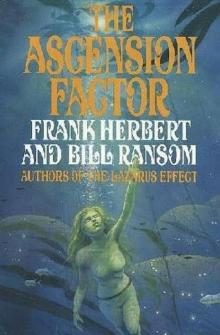 The Ascension Factor
The Ascension Factor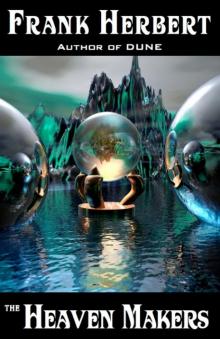 The Heaven Makers
The Heaven Makers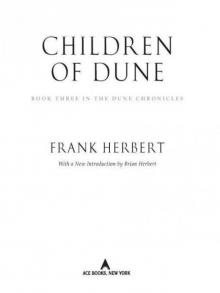 Children of Dune
Children of Dune Old Rambling House
Old Rambling House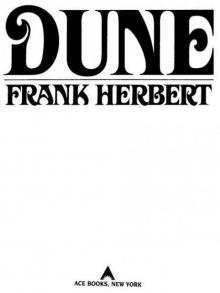 Dune
Dune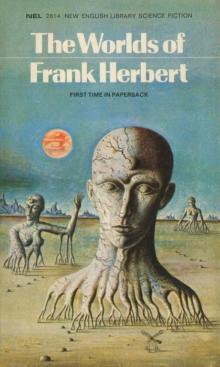 The Worlds of Frank Herbert
The Worlds of Frank Herbert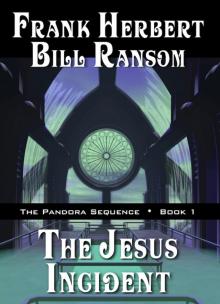 The Jesus Incident
The Jesus Incident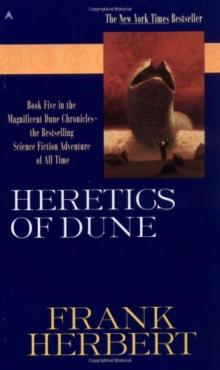 Heretics of Dune
Heretics of Dune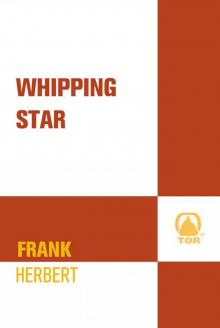 Whipping Star
Whipping Star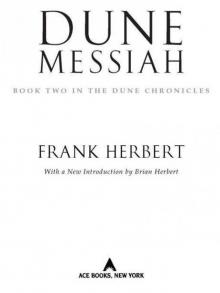 Dune Messiah
Dune Messiah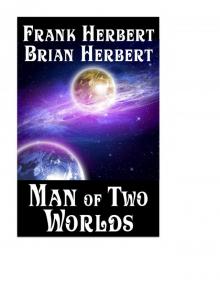 Man of Two Worlds
Man of Two Worlds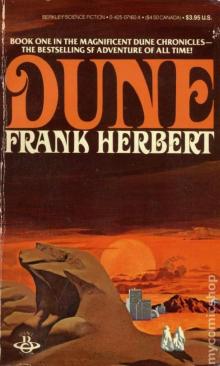 The Book of Frank Herbert
The Book of Frank Herbert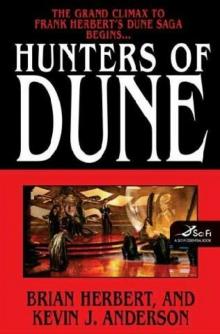 Hunters Of Dune
Hunters Of Dune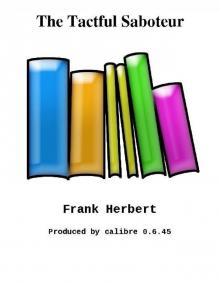 The Tactful Saboteur
The Tactful Saboteur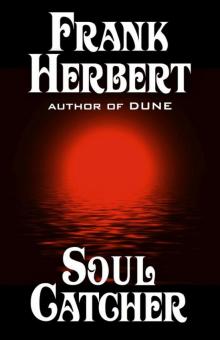 Soul Catcher
Soul Catcher God Emperor of Dune
God Emperor of Dune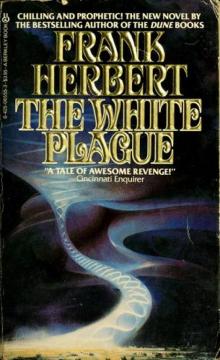 The White Plague
The White Plague The Green Brain
The Green Brain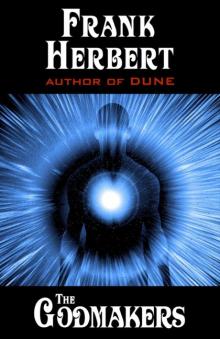 The Godmakers
The Godmakers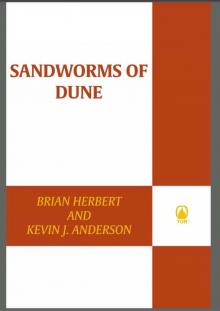 Sandworms of Dune
Sandworms of Dune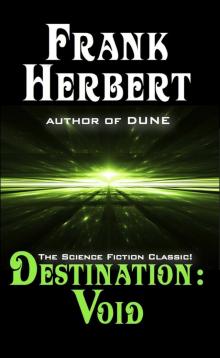 Destination Void
Destination Void The Dosadi Experiment
The Dosadi Experiment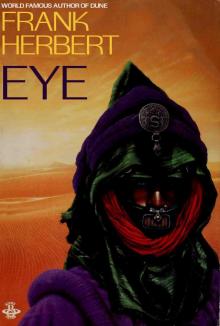 Eye
Eye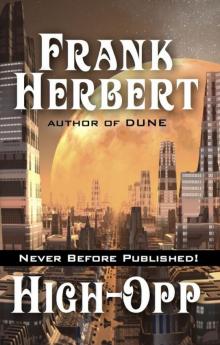 High-Opp
High-Opp The Eyes of Heisenberg
The Eyes of Heisenberg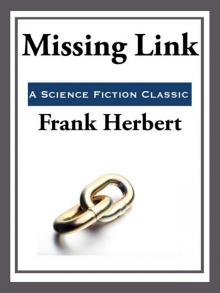 Missing Link
Missing Link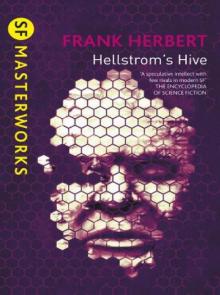 Hellstrom's Hive
Hellstrom's Hive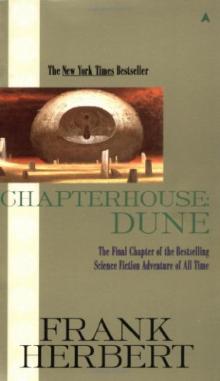 Chapterhouse: Dune
Chapterhouse: Dune The Santaroga Barrier
The Santaroga Barrier The Dragon in the Sea
The Dragon in the Sea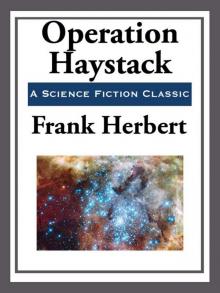 Operation Haystack
Operation Haystack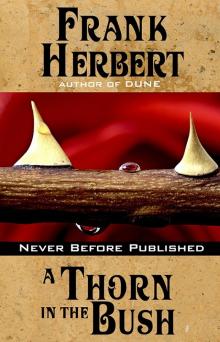 A Thorn in the Bush
A Thorn in the Bush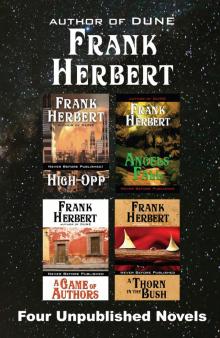 Four Unpublished Novels
Four Unpublished Novels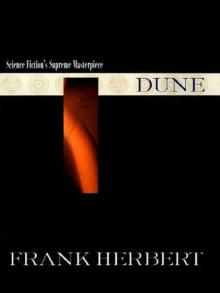 Dune dc-1
Dune dc-1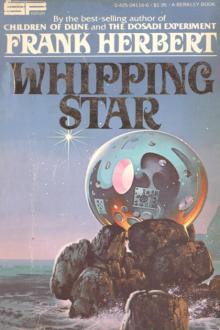 Jorj X. McKie 1 - Whipping Star
Jorj X. McKie 1 - Whipping Star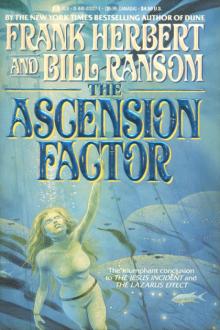 DV 4 - The Ascension Factor
DV 4 - The Ascension Factor Frank Herbert - Dune Book 4 - God Emperor Of Dune
Frank Herbert - Dune Book 4 - God Emperor Of Dune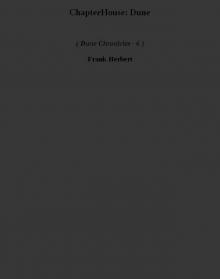 ChapterHouse: Dune dc-6
ChapterHouse: Dune dc-6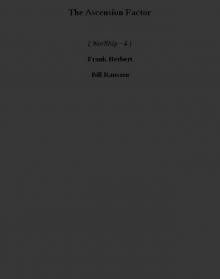 The Ascension Factor w-4
The Ascension Factor w-4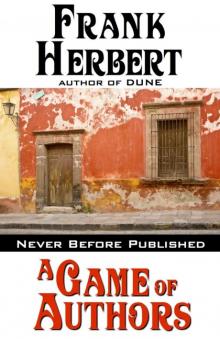 A Game of Authors
A Game of Authors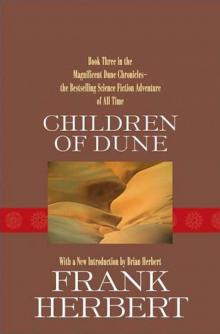 Children of Dune dc-3
Children of Dune dc-3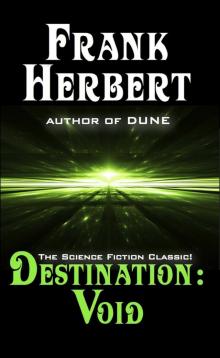 Destination: Void: Prequel to the Pandora Sequence
Destination: Void: Prequel to the Pandora Sequence The Collected Stories of Frank Herbert
The Collected Stories of Frank Herbert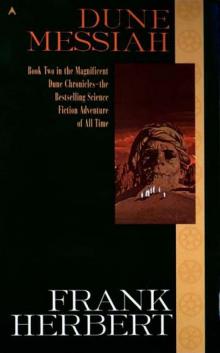 Dune Messiah dc-2
Dune Messiah dc-2 Frank Herbert - Dune Book 5 - Heretics of Dune
Frank Herbert - Dune Book 5 - Heretics of Dune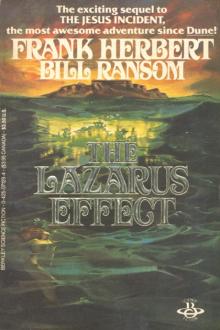 DV 3 - The Lazarus Effect
DV 3 - The Lazarus Effect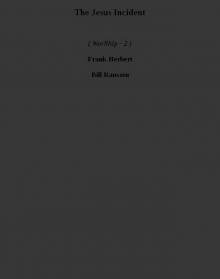 The Jesus Incident w-2
The Jesus Incident w-2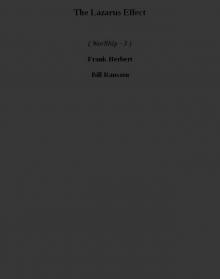 The Lazarus Effect w-3
The Lazarus Effect w-3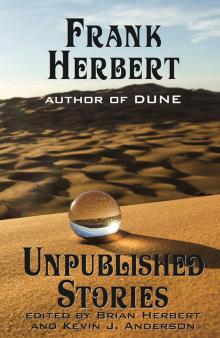 Frank Herbert
Frank Herbert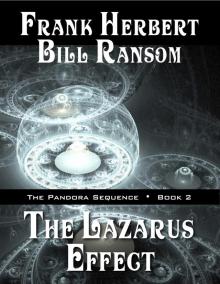 The Ascension Factor: Pandora Sequence
The Ascension Factor: Pandora Sequence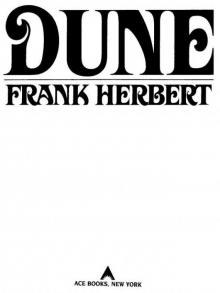 Dune (40th Anniversary Edition)
Dune (40th Anniversary Edition)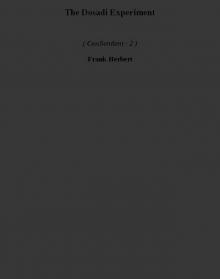 The Dosadi Experiment c-2
The Dosadi Experiment c-2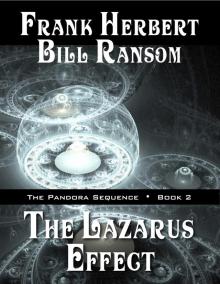 The Lazarus Effect
The Lazarus Effect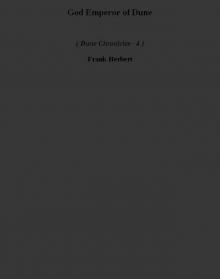 God Emperor of Dune dc-4
God Emperor of Dune dc-4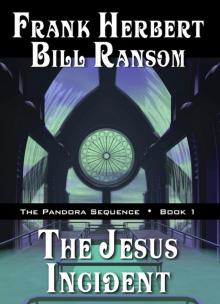 The Pandora Sequence: The Jesus Incident, the Lazarus Effect, the Ascension Factor
The Pandora Sequence: The Jesus Incident, the Lazarus Effect, the Ascension Factor The Green Brain (v4.0)
The Green Brain (v4.0) The Heaven Makers (v4.0)
The Heaven Makers (v4.0)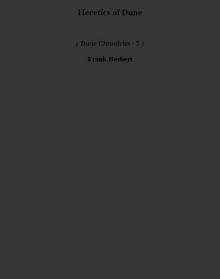 Heretics of Dune dc-5
Heretics of Dune dc-5